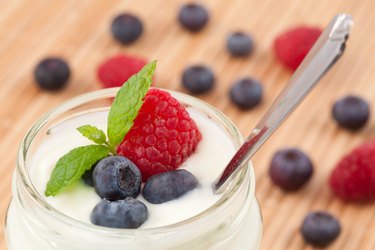
If you check out the label on protein bars, yogurt, cereal bars or sports recovery drinks, you may see the ingredient "milk protein isolate." As suggested by its name, this substance is a concentrate that provides the same proteins found in fresh milk. Milk protein adds a high-quality boost of amino acids to these products that helps you gain or maintain lean muscle, increases feelings of fullness and enhances their texture.
How It's Made
Video of the Day
Manufacturers start with milk and remove the lactose, the primary dairy sugar, through filtering, dialysis or another process. The result is a product that contains the two types of protein in milk, casein and whey, in the original ratios found in liquid milk -- about 80 to 90 percent casein and 10 to 20 percent whey. Milk protein isolate's total protein content is at least 90 percent with less than 3 percent fat, very few carbohydrates and almost no lactose, making it suitable for most people who have lactose intolerance.
Video of the Day
Milk Protein Isolate Uses
Milk protein isolate comes as a powder that can be added to packaged bars to keep them moist, boost their protein content, enhance flavor, extend shelf life and improve texture. Manufacturers sometimes add it to dairy foods to improve their nutritional profile -- particularly milk or yogurt. You might also find it sold on its own to use as a supplement for people who don't get enough protein in their diet or choose to supplement after workouts. Mix milk protein isolate into smoothies, cereal or casseroles to boost the protein content.
Protein Quality
Milk protein isolate is a high-quality protein source. Use it to augment whole-food protein sources, such as meat, poultry, fish and eggs. Foods with milk protein isolate are often marketed to athletes to use in post-workout recovery. Both whey and casein offer all the essential amino acids necessary for muscle growth in a highly digestible form. The high-quality protein can also be of use to the elderly, who sometimes don't get ideal nutrition, and people with wasting diseases, such as cancer.
Cost Effective
Milk protein isolate may be a viable alternative to whey protein, especially when it comes to bars and sports drinks. Whey protein is a byproduct of the cheese-making process and can be pricey for manufacturers due to its limited availability. Milk protein isolate offers a less expensive alternative to manufacturers who want to fortify their products with extra protein. Substituting milk protein isolate for whey protein doesn't affect the texture or taste of products and offers many of the same benefits.